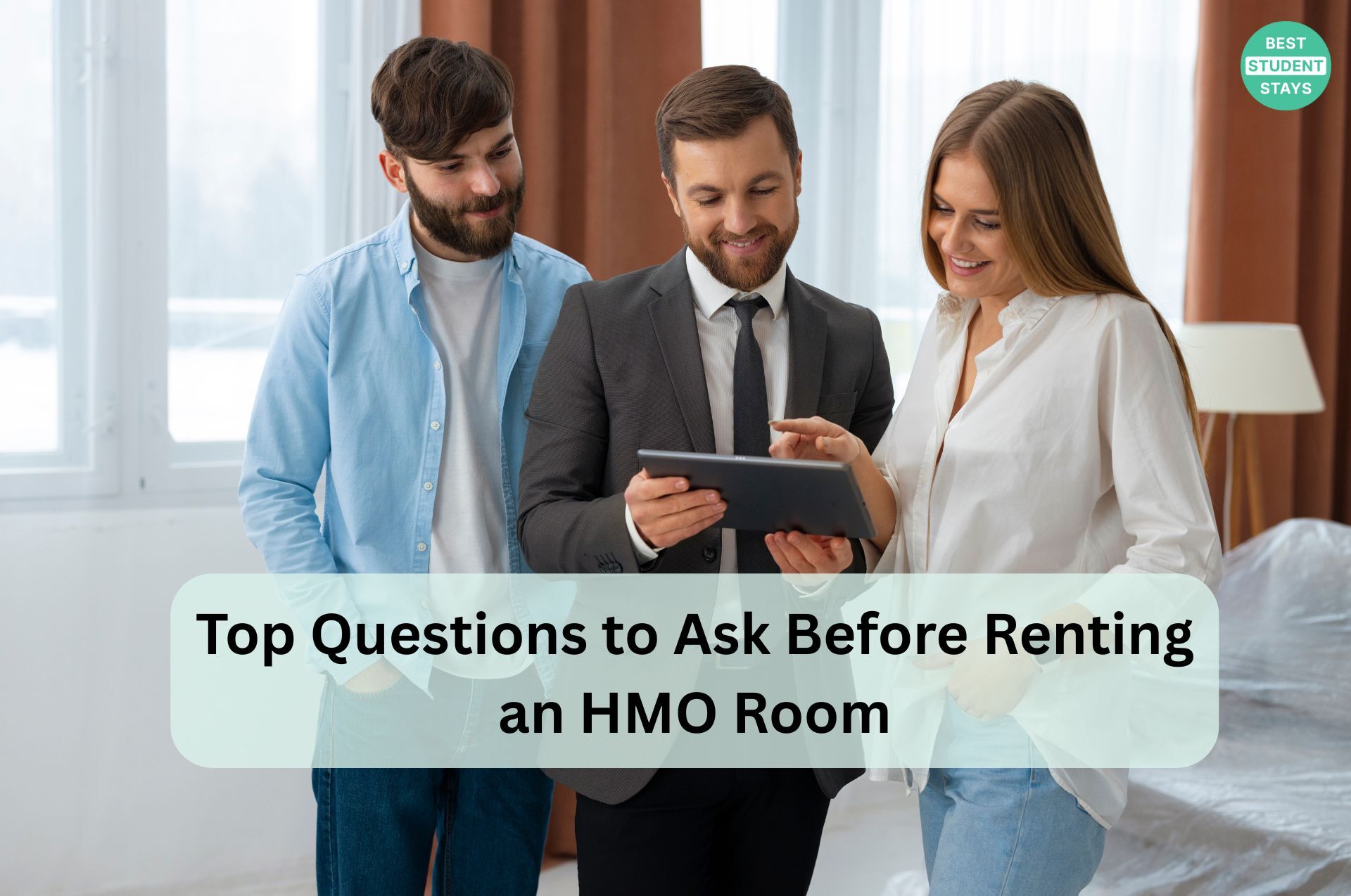TL;DR
Right, here's the deal with moving into an HMO - check the bloody licence first (seriously, this matters), do a proper inventory, test everything works, meet your new housemates without being weird about it, sort your insurance, and don't be that person who doesn't clean up after themselves. Budget around £200-500 for initial bits and bobs. Most importantly - if there's 3+ unrelated people, there should be an HMO licence.
Moving into your first HMO was one of the most stressful things I'd done until I figured out what actually mattered. Everyone bangs on about packing lists, but nobody tells you about the legal stuff that could seriously mess up your year.
I've lived in three different HMOs now, and trust me, the ones where I did my homework beforehand were infinitely better experiences than the one where I just rocked up with my bags and hoped for the best.
Here's everything I wish someone had told me before my first HMO move-in day.
Why HMO Moving Is Different (And Why This Matters)
Look, I know everyone says "shared housing is just like living with friends" but that's bollocks. When you're living in an HMO, you're dealing with proper legal requirements, council licensing, and people you've probably never met before who might have completely different ideas about cleanliness.
My first HMO was a disaster because I didn't understand any of this. The landlord was dodgy, one housemate never cleaned anything, and I had no idea what my rights were when things went wrong.
What makes HMOs special:
-
You've got council licensing requirements
-
Enhanced safety stuff that actually matters
-
Shared spaces that need proper rules
-
Multiple tenancy agreements (which can get messy)
-
Different legal protections
Understanding this stuff early saves you massive headaches later.
Pre-Move Detective Work (Start This 2-4 Weeks Early)
The HMO Licence Thing (This Is Crucial)
Right, this is the big one that nobody talks about properly. If your landlord doesn't have the right licence, you could end up homeless when the council shuts the place down. I've seen it happen.
Here's what you need to know:
-
5+ people = definitely needs a mandatory licence
-
3+ people = might need one depending on your council
-
No licence = you can actually get your rent back (seriously)
How to check (and actually do this):
-
Google "[your area] HMO licence register"
-
Type in your postcode
-
Check your exact address appears
-
Screenshot the licence details
-
If it's not there, ask your landlord directly
I once viewed a place where the landlord got really shifty when I asked about licensing. Massive red flag. Walked away and found somewhere proper instead.
Your Tenancy Agreement (Read The Boring Bits)
I know it's tempting to just sign and get on with it, but spending 20 minutes actually reading this thing can save you hundreds of pounds later.
The bits that actually matter:
-
Are you liable for the full rent if someone else leaves? (Joint tenancy nightmare)
-
Who sorts the bills and how much will you actually pay?
-
Can you have friends over? Some places are really strict about this
-
What happens if you need to leave early?
Questions I always ask now:
-
"What happens if my housemate stops paying rent?"
-
"Who's responsible if the boiler breaks?"
-
"Can I get people to stay over at weekends?"
Deposit Protection (Your Money Matters)
Your landlord has 30 days to protect your deposit in a government scheme. If they don't do this, they can't evict you and you can claim compensation. Found this out the hard way.
The three proper schemes:
-
Deposit Protection Service (DPS)
-
MyDeposits
-
Tenancy Deposit Scheme (TDS)
You should get an email with certificate details. No email = no protection = potential problems.
Safety Stuff That Actually Keeps You Alive
Get The Certificates (And Actually Look At Them)
Gas Safety Certificate: This isn't just paperwork - I had a housemate who got carbon monoxide poisoning because our landlord was skipping the annual checks. Scary stuff.
-
Must be done every year
-
Covers the boiler, hob, everything gas-related
-
You should see the actual certificate, not just be told "it's fine"
Electrical Certificate: Landlords sometimes try to skip this one because it's expensive. Don't let them.
-
Valid for 5 years
-
Tests all the wiring in the house
-
Essential if you don't want electrical fires
Test Everything On Day One
Smoke alarms: Press that little test button in every room. I once moved into a place where half the alarms had dead batteries. Not ideal.
Carbon monoxide alarms: Should be near any gas appliances. Learn what carbon monoxide poisoning feels like (headaches, dizziness, nausea) because it's a silent killer.
Fire safety equipment: Know where the fire extinguisher is, check the fire blanket isn't ancient, and make sure you can actually get out quickly if needed.
Move-In Day Reality Check
The Inventory Check (Document Everything)
This is where you avoid getting screwed over when you move out. Take photos of absolutely everything, even stuff that looks fine.
My photo checklist:
-
Every wall, especially around light switches
-
All furniture from different angles
-
Kitchen appliances (inside and out)
-
Bathroom tiles, shower head, toilet seat
-
Carpets, especially any stains or wear
-
Windows and window sills
I use a timestamp camera app so there's no argument about when photos were taken. Email them to your landlord the same day.
Pro tip: Test every single appliance. I once found a washing machine that flooded the kitchen, but only discovered it three weeks after moving in. Much harder to prove it wasn't my fault.
Utilities and Systems Check
Heating: Turn on every radiator and check the hot water works properly. British houses can be freezing, and you don't want to discover heating problems in January.
Water pressure: Test the shower pressure when you're viewing, not just on move-in day. Nothing worse than a dribbling shower when you're running late for lectures.
Internet: Check the WiFi actually reaches your room properly. Some HMOs have dead spots where the signal's rubbish.
First Week Survival Guide
Meeting The Housemates (Without Being Weird)
Your housemates can make or break your HMO experience. I've lived with absolute legends and complete nightmares, often in the same house.
What actually works:
-
Suggest a house meeting in the first week
-
Exchange numbers (WhatsApp group is usually best)
-
Discuss the obvious stuff: cleaning, guests, noise
-
Don't try to be best friends immediately - just aim for functional
Red flags to watch for:
-
Someone who won't engage in basic house discussions
-
People who are clearly already stressed about money
-
Anyone who mentions "my girlfriend/boyfriend will be staying over most nights"
House Rules That Actually Matter
Forget the complicated lists - focus on the stuff that actually causes arguments:
Kitchen:
-
Wash up within 24 hours (immediate is better)
-
Label your food clearly
-
Clean the hob after cooking
-
Don't use other people's expensive ingredients
Bathroom:
-
Clean up your hair from the shower
-
Keep your toiletries in your own space
-
Don't leave wet towels everywhere
-
Respect morning routine timings
General:
-
Quiet hours (usually 10pm-8am on weekdays)
-
Guest policy (how often, how long)
-
Temperature settings (this causes so many arguments)
Money Stuff (The Boring But Important Bits)
Setting Up Utilities
If bills aren't included (and sometimes even when they are), you need to understand how this works.
What usually happens:
-
One person puts bills in their name
-
Everyone pays their share monthly
-
Someone inevitably ends up chasing people for money
My approach:
-
Set up a separate bank account just for bills
-
Everyone pays into it by standing order
-
Bills come out automatically
-
Review spending every few months
Rough monthly costs per person:
-
Gas & electricity: £30-50
-
Water: £15-25
-
Internet: £8-15
-
TV licence: £13.25 (split between everyone)
Contents Insurance (Get This)
HMOs get burgled more than regular houses. It's just a fact. Your laptop, phone, and other expensive stuff isn't covered by the landlord's insurance.
What I look for:
-
At least £6,000 personal possessions cover
-
Accidental damage (trust me, you'll need this)
-
Cover when you're away from home
-
Student discount (usually 10-15% off)
Costs about £10-15 monthly for decent cover. Cheaper than replacing a stolen laptop.
Local Registration (Do This Quick)
GP registration: Don't put this off. When you're properly ill at 2am, you don't want to be scrambling to find a doctor.
Council tax: If you're all full-time students, you should be exempt. Apply for this immediately because councils are slow and will try to charge you anyway.
Electoral register: Takes 5 minutes online and improves your credit score. Future you will thank present you.
Daily Life Hacks
Kitchen Politics
The kitchen is where most HMO arguments start. Learn these unwritten rules:
Storage:
-
One cupboard per person usually
-
Fridge space gets divided equally
-
Freezer space is premium - don't be greedy
-
Label everything with your name and date
Cleaning:
-
Clean as you go, not once a week
-
Deep clean the whole kitchen on rotation
-
Buy communal stuff together (washing up liquid, bin bags)
-
Don't let washing up pile up "for later"
Food:
-
Don't eat other people's food (even if it looks abandoned)
-
Milk sharing usually works, but discuss it first
-
Cooking smells linger - be considerate
-
Late night cooking noise travels
Bathroom Etiquette
Timing:
-
Don't monopolise the bathroom during morning rush hour
-
Quick showers during busy periods
-
Night-time routines should be quieter
-
Plan ahead for important days
Cleanliness:
-
Wipe down surfaces after use
-
Clear your hair from the plughole
-
Keep personal items contained
-
Replace toilet roll when you finish it
Noise Management
Living with other people means compromise on noise levels.
What works:
-
Headphones for music and gaming
-
Closing doors gently
-
Being mindful of footsteps on stairs
-
Keeping phone conversations quieter in communal areas
What doesn't:
-
Expecting complete silence all the time
-
Making noise without considering others
-
Having loud phone calls at antisocial hours
-
Slamming doors when you're annoyed
When Things Go Wrong (And They Will)
Common HMO Problems
Money issues: Someone always struggles with bills eventually. Have a plan for this.
Cleaning disputes: The classic HMO argument. Set expectations early and stick to them.
Noise complaints: Usually easily sorted with a conversation, but sometimes needs landlord involvement.
Maintenance problems: Landlords sometimes try to blame tenants for normal wear and tear.
Your Rights (Know These)
Against your landlord:
-
Right to safe, habitable property
-
24-hour notice before inspections
-
Deposit protection requirements
-
Prompt maintenance responses
Against problem housemates:
-
Right to reasonable enjoyment of your home
-
Protection from harassment
-
Equal access to communal areas
-
Safety and security
Getting Help
Free advice:
-
Citizens Advice (brilliant and free)
-
University housing services
-
Shelter housing charity
-
Local council housing team
When to involve the landlord:
-
Safety issues immediately
-
Maintenance problems after reasonable self-help
-
Serious disputes between housemates
-
Any licensing or legal concerns
Exit Strategy (Plan Ahead)
When To Give Notice
Most HMO tenancy agreements need one month's written notice. Start planning your next move early because good places get snapped up quickly.
Things to consider:
-
Academic year timings
-
Housemate relationships
-
Area preferences for next year
-
Budget changes
Getting Your Deposit Back
Document everything:
-
Take photos when you move out (same as when you moved in)
-
Clean thoroughly (professional cleaning if needed)
-
Repair any damage you've actually caused
-
Return all keys and access cards
Common deposit deductions:
-
Excessive cleaning charges
-
Damage beyond normal wear and tear
-
Unreturned keys
-
Outstanding bills
Most disputes are about cleanliness standards, so be thorough.
Final Thoughts
HMO living isn't for everyone, but when it works, it's brilliant. You get affordable rent, built-in social life, and learn loads about living with different people.
The key is preparation. Do your homework before moving in, communicate clearly with housemates, and know your rights if things go wrong.
I've had some of my best university memories in HMO houses, and also some of my worst moments. The difference was usually how well prepared I was and whether I'd done the basic checks outlined here.
Moving into an HMO doesn't have to be stressful if you know what you're doing. Use this checklist, trust your instincts, and don't be afraid to walk away from places that don't feel right.
Looking for HMO accommodation that meets all the proper standards? Check out Best Student Stays for verified HMO properties where the licensing and safety checks have already been done for you. Makes the whole process much less stressful when you know the basics are sorted.



